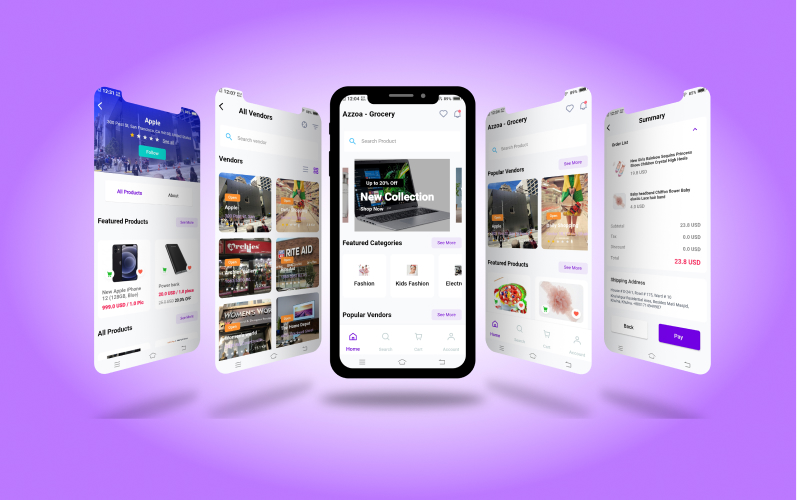In 2021, a wide range of mobile applications became available. This category includes Android, iOS, Native development, Cross-platform, Hybrid, and Progressive Web Apps. But which is the best in terms of business? A mobile experience can be delivered in a variety of ways. Each project necessitates a distinct strategy. This blog post will discuss the distinctions between native and hybrid app development. Which one is the most effective, and when should you use it? Let’s have a look at it together!
A mobile application is a computer program or software application that is specifically created for tablets and smartphones. Mobile app development includes gathering requirements, evaluating, developing, creating, and testing software applications for portable devices.
What Is Native App Development?
Apps that are created for only one platform are referred to as mono-platform apps. A native app is made utilizing platform-specific tools and programming languages. It might be a native Android app written in Kotlin or an iOS app written in Swift and Objective-C.
Although native apps take a long time to develop, they are user-friendly and provide a high-performance user experience. The platform UX is responsible for all graphics and essential functionalities. The expensive cost of native app development is the only drawback; hence companies frequently opt for other choices.
What Is Hybrid App Development?
Hybrid app development entails creating a single code bar that works across several platforms. It is possible to develop communication between the platform and the web view using particular techniques, developing hybrid apps feel like native apps.
This is built on web technologies such as Sass, JavaScript, CSS, and HTML. The code is wrapped in a native app utilizing cross-platform frameworks like React Native after it has been developed. Although hybrid apps are built using web technologies, they have the same feel as native apps and give the same user experience.

Native and hybrid app examples
A native app is a smartphone application that is developed specifically for a particular mobile device and operating system. A hybrid app is a mobile application that combines the best features of both native and web-based apps.
Some examples of native apps include the Camera app, which comes pre-installed on most smartphones, and the Maps app, which is available on iPhones and iPads. Some examples of hybrid apps include Instagram and Vine, which are available on both iOS and Android devices.
Native vs Hybrid App Core Differences
Native apps are developed specifically for one platform. For example, an app for the iPhone/iOS platform would be written in Objective-C or Swift and would only work on devices that use the iOS operating system.
Hybrid apps are developed using web technologies (HTML, CSS, and JavaScript) and then wrapped in a native container. This allows them to be run on multiple platforms, including iOS, Android, and Windows.
The following are some key differences between native and hybrid apps:
| Particulars | Native Apps | Hybrid Apps |
|---|---|---|
| Development | written in the specific programming language for the platform they are designed for | written using web technologies |
| Platforms | can only be run on the developed platform | run on multiple platforms |
| Performance | tend to be faster and more responsive | can be slower and less responsive. |
| Cost | more expensive to develop | less expensive |
| Time to market | take longer to develop and release | can be released more quickly |
| Features | can take advantage of platform-specific features | hybrid apps are designed to be portable across multiple platforms |
So, which one should you choose for your app? It depends on your specific needs and requirements. If you need an app that is fast and responsive and makes use of platform-specific features, then a native app is the way to go. If you need an app that is less expensive to develop and can reach a wider audience, then a hybrid app might be a better choice.
Native Vs Hybrid Mobile App Development: Things to Consider
When it comes to developing a mobile app, there are a few details to keep in mind before making significant decisions, especially when it comes to native versus hybrid app development.
1. Development Time and Cost
Setting clear goals is an important aspect of any development project management. Diving into a project without a game plan is a big no-no.
Before you commit to a project, you should have a good awareness of your resources. Consider your budget as well as your time limits.
Also, make sure your software development staff is aware of the situation. This type of communication is crucial to the implementation of an agile software development process.
You can pick whether you want to design a hybrid app or a native app once you’ve determined how many resources you’re willing or able to devote to your mobile app development project.
To summarize, hybrid apps are often less expensive to design than native apps because only one codebase is required.
2. User Interaction (UX)
When it comes to software development, user experience should always be one of your top considerations. There are numerous methods for ensuring that the end user is at the forefront of the development process at all times.
Design thinking is an example of such a technique. It is an iterative process in which developers challenge assumptions and define and redefine challenges to understand the end user better.
Native apps are usually the greatest in terms of user experience, although they can be costly, as previously said. For some, the cost-effectiveness of turning hybrid overcomes the loss of peak performance.

3. App performance
Because app performance and user experience are so closely linked, it’s no wonder that hybrid apps suffer in this area as well.
You may thank the latest hybrid technologies for making it feasible to create highly performant hybrid apps. However, the majority of people still believe that native apps perform better than non-native apps.
They don’t rely on internet access to function, so that’s one less thing to worry about. Native apps’ backend services communicate directly with their native hardware.
4. Model of Monetization
When it comes to monetization, native mobile apps have the upper hand. CPM, or ‘cost per 1000 impressions,’ is crucial to your app’s revenue success.
Native mobile apps, including hybrid apps, have a higher CPM than everything else on the web. To be clear, hybrid apps are online apps wrapped in a native container that can be downloaded from your local app store.
Because ad blockers are becoming more widespread on web browsers, web apps do not generate as much revenue from advertising as an in-app native ad would.
Native apps may keep the general design of your native device, which helps the user interface. Furthermore, they may collaborate more effectively when both the front-end and back-end have access to native functionalities.
The Bottom Line
The decision between native and hybrid app development can be difficult. For tech firms who want to get a head start in mobile app development but don’t have the resources to commit to native development, hybrid app development can be a quick fix.
Native app development, on the other hand, is always a viable option. Native app development has several advantages, including excellent performance and high revenue-producing advertisements.




